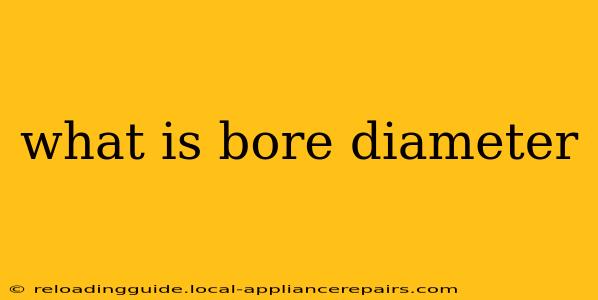Bore diameter, often shortened to simply "bore," is a crucial specification in various engineering and manufacturing fields, most notably in engines (internal combustion engines, pumps, compressors) and firearms. Understanding bore diameter is essential for selecting the correct components, ensuring proper functionality, and guaranteeing safety. This guide will delve into the definition, measurement, significance, and applications of bore diameter.
Defining Bore Diameter
Simply put, bore diameter refers to the internal diameter of a cylindrical cavity. This measurement is taken from one side of the cylinder wall to the opposite, passing through the center. It's the diameter of the hole in a component, not the external diameter of the component itself. This is a critical distinction.
Think of it this way: if you were to look down into a cylinder (like the cylinder in a car engine), the bore diameter is the measurement across the widest part of that cylindrical hole.
Different Contexts, Same Principle
While the fundamental concept remains the same, the context significantly influences the practical implications of bore diameter:
-
Internal Combustion Engines: In engines, the bore diameter defines the size of the cylinder where the piston moves up and down. A larger bore diameter generally allows for a larger piston displacement, leading to increased engine power. However, this also influences factors like engine speed and fuel efficiency.
-
Firearms: In firearms, the bore diameter is the diameter of the barrel's interior, determining the caliber of the ammunition that can be used. The precise measurement and tolerances of the bore diameter are critical for accuracy and safety. Slight variations can significantly impact bullet trajectory and weapon performance.
-
Pumps and Compressors: In pumps and compressors, the bore diameter influences the volume of fluid or gas that can be handled per cycle. Accurate measurement and selection are vital for optimal system performance.
Measuring Bore Diameter
Precise measurement of bore diameter requires specialized tools and techniques depending on the application and required accuracy. Common methods include:
-
Caliper: For general purpose, a caliper (both internal and external) can provide a reasonable estimate. However, for critical applications, more sophisticated methods are necessary.
-
Bore Gauge: These specialized tools are designed to accurately measure the internal diameter of cylinders and other cylindrical components. Various types of bore gauges exist, each offering a specific range and level of accuracy.
-
Optical Methods: Optical methods, such as using a borescope with a measuring scale, are used to measure bores that are difficult to access physically. These also provide a visual inspection for any imperfections on the cylinder walls.
The Significance of Bore Diameter
The bore diameter significantly impacts the performance and functionality of various mechanical systems. Here's how:
-
Engine Performance: As mentioned earlier, a larger bore contributes to greater engine power and torque.
-
Firearm Accuracy: Precise bore diameter in firearms ensures consistent bullet trajectory and reduces variations in accuracy.
-
Fluid Handling Capacity: In pumps and compressors, bore diameter directly relates to the volume of fluid or gas that can be processed.
-
Component Compatibility: Matching the bore diameter with other components (pistons, seals, etc.) is crucial for proper assembly and functionality.
Conclusion
Understanding bore diameter is crucial in many engineering and manufacturing disciplines. Accurate measurement and proper selection of components with matching bore diameters are essential for ensuring optimal performance, reliability, and safety across various applications, from high-performance engines to precision firearms. While a simple concept, its practical applications are far-reaching and demand precise attention to detail.

